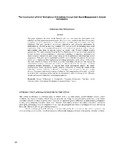The construction of girls’ motivational orientations through their social engagement in school mathematics

View/
Date
2010-06Author
Nkhwalume, A.
Publisher
IJSRE, http://www.ijsre.comType
Published ArticleMetadata
Show full item recordAbstract
This paper represents the voices of six Botswana girls in a case study that investigated social influences on their motivation in mathematics. Interviews were conducted and observations made to explore the girls’ experiences to shed some light on where their motivations were most influenced. The girls’ perceived motivational orientations and subsequent performance in mathematics as reflected in their case scenarios were used as a way of explaining their social implications. Their social experiential narratives were analysed for meaning with a focus on understanding them from an African context in contrast with Western cultural research perspectives. The study emanated from the fact that Botswana women are not vividly present at the post-secondary level in mathematics, science and technology. A compulsory mathematics at senior secondary school level, most young women opt out of mathematics and technology related programmes. The girls’ social experiential narratives were collected and analysed for meaning with a view to understand their implications in learning mathematics in the context of Botswana. The study adopted the Marxist social theory as its theoretical framework and used the concepts of contradiction, ideology, discourse and habitus as operational tools for the girls’ socialised orientation towards mathematic. It emerged that social environment, namely: the family (socioeconomic status, educational beliefs, attitudes, availability of books); the school system (schooling, teachers, textbooks, mathematics curriculum, and assessment) and peer groups (friends, classmates) were the key sources of influence. The interpretations of the girls’ narratives gave rise to the conclusions drawn and the recommendations made concerning social influences on their motivational orientations in learning mathematics.
